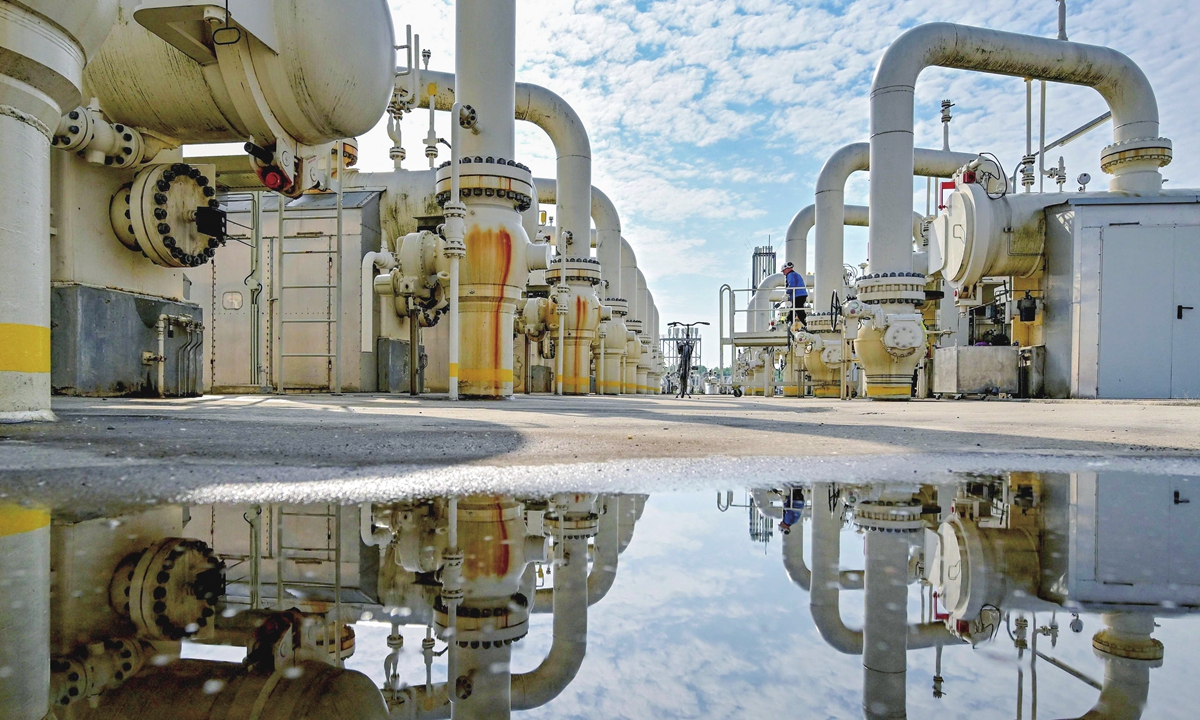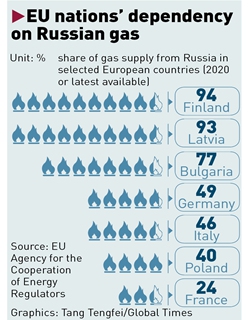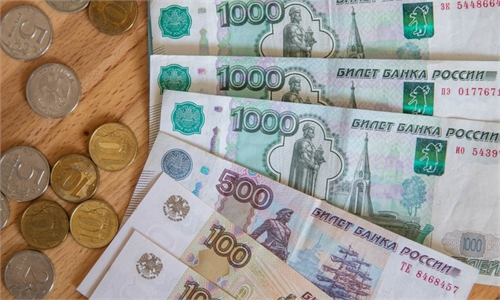EU can’t replace Russian gas with African imports: experts
Lack of infrastructure for cross-region transport, high costs pose challenges: experts

Equipment running at one of the largest interconnection gas hubs in Europe at Baumgarten an der March, Lower Austria on May 9, 2022. The facility mainly receives Russian imports, but takes also shipments of gas from some other countries. Photo: VCG
Europe has taken the first step toward slashing its reliance on Russia's natural gas, with German Chancellor Olaf Scholz making his first trip to Africa pursuing energy cooperation. However, experts said it's impossible for the European Union to cut Russian gas in the short term, as getting a complex and capital-intensive industry off the ground in Africa could take years.
Germany has initiated talks with the Senegalese authorities about gas extraction and liquified natural gas (LNG), Scholz said, according to a Reuters report on Monday. It said that Germany could help explore a gas field in Senegal, citing a German official.
Senegalese President Macky Sall said the country is ready to work toward supplying the European market with LNG, with the LNG output forecast to reach 2.5 million tons in 2023 and 10 million tons by 2030, according to the report.
"Although seeking gas cooperation with Africa might supply European countries in the long term, distant water cannot quench present thirst," Jin Lei, an associate professor at the China University of Petroleum, told the Global Times on Tuesday.
Compared with extensive gas pipelines linking Russia and European countries, only some countries in North Africa have established pipelines to South Europe, with a broadening of new energy supply mix in the region much-needed, Jin said.
While the establishment of such a large amount of infrastructure could take years, the cost and technical challenges of cross-regional transportation are big issues. Therefore, there are only a handful of regional markets with a geographical distribution of the resources, for example a market among Russia, Central Asian countries and the EU, experts noted.
According to an article by African energy investment platform Energy Capital & Power, almost half of the continent's 55 countries are known to have proven natural gas reserves, with the amount predicted to total more than 800 trillion cubic feet. African countries with the largest potential natural gas production include Nigeria, Senegal and Mozambique.
Despite large gas reserves in Africa, upstream exploitation is insufficient due to limited investment, Jin said. "Along with the ease of Russia-EU tensions after the Russia-Ukraine conflict, European countries will very likely continue to purchase gas from Russia because of lower prices," he said.
The EU imported more than 40 percent of its total gas from Russia in 2021. Energy represented 62 percent of EU imports from Russia, and cost 99 billion euros ($105 billion), according to the EU Commission.
Following the Russia-Ukraine conflict, the EU has set a goal of cutting its reliance on Russian natural gas by two thirds in 2022.
However, Germany and Italy - which heavily rely on Russia for gas supplies - have recently told companies that they could open ruble accounts to keep buying Russian gas without breaching sanctions against Russia following discussions with the EU, according to a separate Reuters report. Poland, Bulgaria and Finland that have refused to comply with Russia's demand that importers have to pay for gas via ruble accounts have had their supplies cut.

Graphics: Tang Tengfei/Global Times
Long-term investment
Unlike European countries' volatile investment in Africa out of purpose of seeking natural resources there, China's investment in Africa is relatively stable as the country strives to promote their internal impetus for economic development by earnestly carrying out a large number of infrastructure projects and ramping up technological support and the nurture of talent, experts noted.
According to experts, Africa is a region that Chinese oil and gas companies have conducted investment and operation relatively earlier than in other areas, built on in-depth cooperation, sound beneficial results and sustainable development. By the end of 2020, Chinese companies participated in the investment and operation of around 30 oil and gas cooperation projects in 15 African countries, such as Sudan, Nigeria and Angola, media reports said.
While China actively boosts its energy and infrastructure investment in Africa and promotes the region's industrialization and economic growth, Western countries have set up a variety of impediments, seriously limiting energy exploration in Africa, Liu Hongwu, dean of the Institute of African Studies Zhejiang Normal University, told the Global Times.
"In terms of energy exploration, Western countries should engage in cooperation with China in expanding in Africa in the long run, and then re-invest for the region's economic development," Liu said, noting that Western countries' temporary investment for its own interest doesn't work.
At the Eighth Ministerial Conference of the Forum on China-Africa Cooperation held in November 2021, China and Africa issued a joint declaration on climate change cooperation, stating that China will also play a positive role in improving energy structure of African countries.
"China will further increase investment in Africa on low-emission projects including photovoltaic, wind and other renewable energies, energy-saving technologies, high-tech industries, and green and low-carbon industries, and will not build new coal-fired power projects abroad," according to the declaration.


